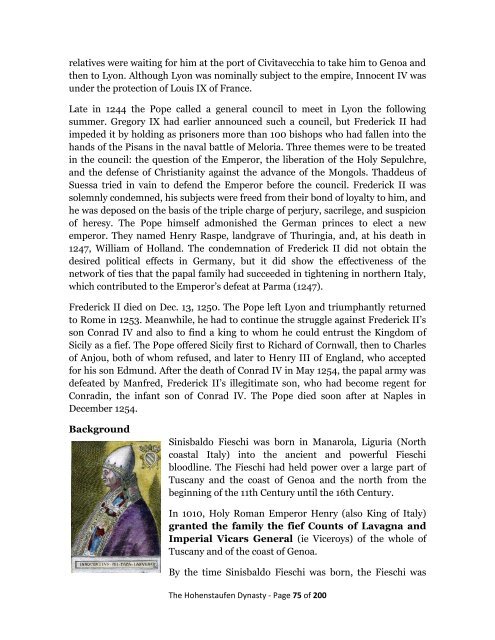here - Nobility Associations
here - Nobility Associations
here - Nobility Associations
You also want an ePaper? Increase the reach of your titles
YUMPU automatically turns print PDFs into web optimized ePapers that Google loves.
elatives were waiting for him at the port of Civitavecchia to take him to Genoa and<br />
then to Lyon. Although Lyon was nominally subject to the empire, Innocent IV was<br />
under the protection of Louis IX of France.<br />
Late in 1244 the Pope called a general council to meet in Lyon the following<br />
summer. Gregory IX had earlier announced such a council, but Frederick II had<br />
impeded it by holding as prisoners more than 100 bishops who had fallen into the<br />
hands of the Pisans in the naval battle of Meloria. Three themes were to be treated<br />
in the council: the question of the Emperor, the liberation of the Holy Sepulchre,<br />
and the defense of Christianity against the advance of the Mongols. Thaddeus of<br />
Suessa tried in vain to defend the Emperor before the council. Frederick II was<br />
solemnly condemned, his subjects were freed from their bond of loyalty to him, and<br />
he was deposed on the basis of the triple charge of perjury, sacrilege, and suspicion<br />
of <strong>here</strong>sy. The Pope himself admonished the German princes to elect a new<br />
emperor. They named Henry Raspe, landgrave of Thuringia, and, at his death in<br />
1247, William of Holland. The condemnation of Frederick II did not obtain the<br />
desired political effects in Germany, but it did show the effectiveness of the<br />
network of ties that the papal family had succeeded in tightening in northern Italy,<br />
which contributed to the Emperor’s defeat at Parma (1247).<br />
Frederick II died on Dec. 13, 1250. The Pope left Lyon and triumphantly returned<br />
to Rome in 1253. Meanwhile, he had to continue the struggle against Frederick II’s<br />
son Conrad IV and also to find a king to whom he could entrust the Kingdom of<br />
Sicily as a fief. The Pope offered Sicily first to Richard of Cornwall, then to Charles<br />
of Anjou, both of whom refused, and later to Henry III of England, who accepted<br />
for his son Edmund. After the death of Conrad IV in May 1254, the papal army was<br />
defeated by Manfred, Frederick II’s illegitimate son, who had become regent for<br />
Conradin, the infant son of Conrad IV. The Pope died soon after at Naples in<br />
December 1254.<br />
Background<br />
Sinisbaldo Fieschi was born in Manarola, Liguria (North<br />
coastal Italy) into the ancient and powerful Fieschi<br />
bloodline. The Fieschi had held power over a large part of<br />
Tuscany and the coast of Genoa and the north from the<br />
beginning of the 11th Century until the 16th Century.<br />
In 1010, Holy Roman Emperor Henry (also King of Italy)<br />
granted the family the fief Counts of Lavagna and<br />
Imperial Vicars General (ie Viceroys) of the whole of<br />
Tuscany and of the coast of Genoa.<br />
By the time Sinisbaldo Fieschi was born, the Fieschi was<br />
The Hohenstaufen Dynasty - Page 75 of 200



